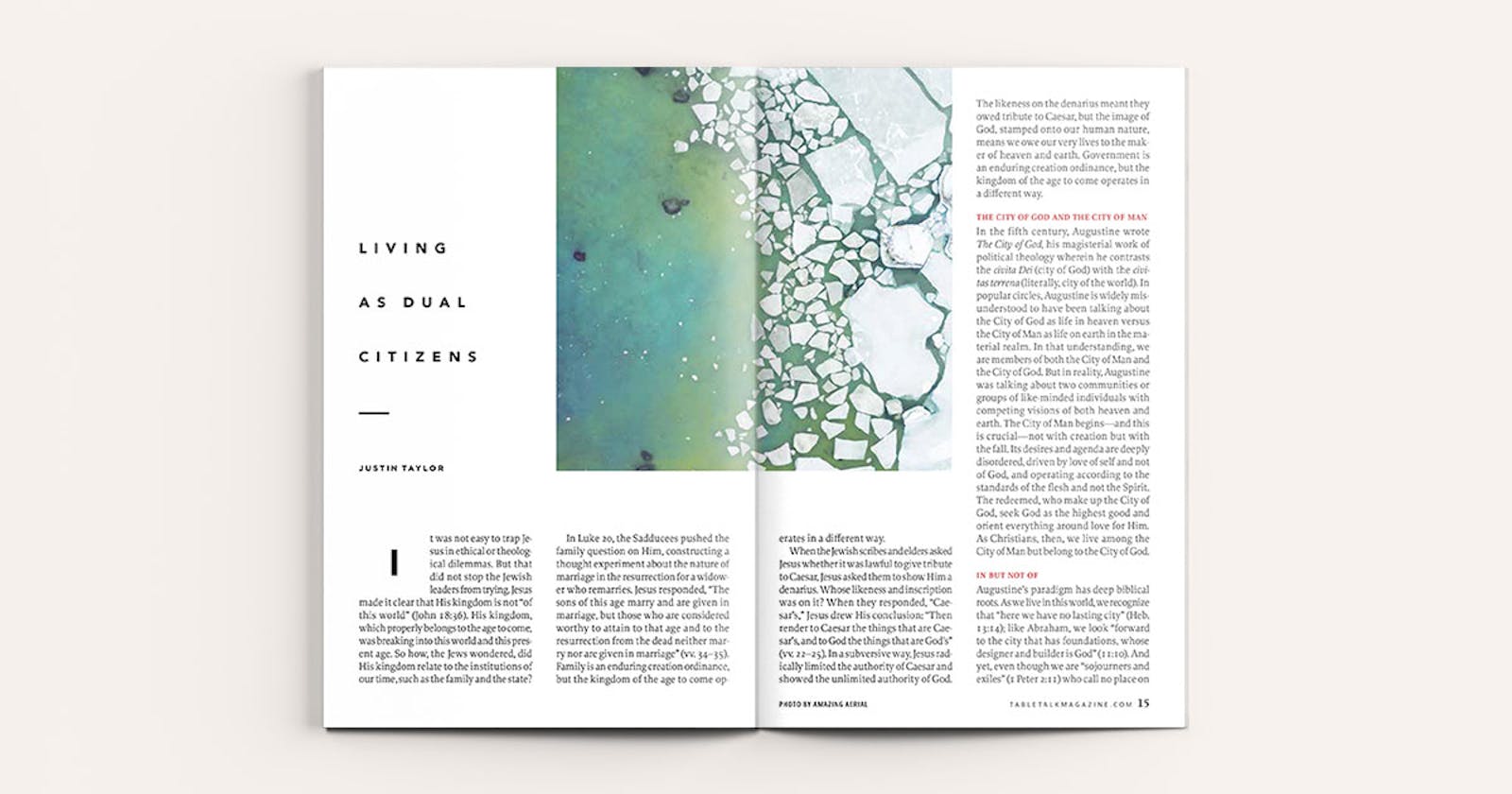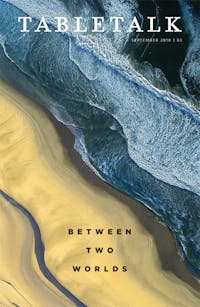
Request your free, three-month trial to Tabletalk magazine. You’ll receive the print issue monthly and gain immediate digital access to decades of archives. This trial is risk-free. No credit card required.
Try Tabletalk NowAlready receive Tabletalk magazine every month?
Verify your email address to gain unlimited access.
It was not easy to trap Jesus in ethical or theological dilemmas. But that did not stop the Jewish leaders from trying. Jesus made it clear that His kingdom is not “of this world” (John 18:36). His kingdom, which properly belongs to the age to come, was breaking into this world and this present age. So how, the Jews wondered, did His kingdom relate to the institutions of our time, such as the family and the state?
In Luke 20, the Sadducees pushed the family question on Him, constructing a thought experiment about the nature of marriage in the resurrection for a widower who remarries. Jesus responded, “The sons of this age marry and are given in marriage, but those who are considered worthy to attain to that age and to the resurrection from the dead neither marry nor are given in marriage” (vv. 34–35). Family is an enduring creation ordinance, but the kingdom of the age to come operates in a different way.
When the Jewish scribes and elders asked Jesus whether it was lawful to give tribute to Caesar, Jesus asked them to show Him a denarius. Whose likeness and inscription was on it? When they responded, “Caesar’s,” Jesus drew His conclusion: “Then render to Caesar the things that are Caesar’s, and to God the things that are God’s” (vv. 22–25). In a subversive way, Jesus radically limited the authority of Caesar and showed the unlimited authority of God. The likeness on the denarius meant they owed tribute to Caesar, but the image of God, stamped onto our human nature, means we owe our very lives to the maker of heaven and earth. Government is an enduring creation ordinance, but the kingdom of the age to come operates in a different way.
The City of God and the City of Man
In the fifth century, Augustine wrote The City of God, his magisterial work of political theology wherein he contrasts the civita Dei (city of God) with the civitas terrena (literally, city of the world). In popular circles, Augustine is widely misunderstood to have been talking about the City of God as life in heaven versus the City of Man as life on earth in the material realm. In that understanding, we are members of both the City of Man and the City of God. But in reality, Augustine was talking about two communities or groups of like-minded individuals with competing visions of both heaven and earth. The City of Man begins—and this is crucial—not with creation but with the fall. Its desires and agenda are deeply disordered, driven by love of self and not of God, and operating according to the standards of the flesh and not the Spirit. The redeemed, who make up the City of God, seek God as the highest good and orient everything around love for Him. As Christians, then, we live among the City of Man but belong to the City of God.
In but Not Of
Augustine’s paradigm has deep biblical roots. As we live in this world, we recognize that “here we have no lasting city” (Heb. 13:14); like Abraham, we look “forward to the city that has foundations, whose designer and builder is God” (11:10). And yet, even though we are “sojourners and exiles” (1 Peter 2:11) who call no place on earth our permanent home, we are also commanded to “seek the welfare of the city . . . and pray to the Lord on its behalf” (Jer. 29:7). We are not to be “of the world” but are irreducibly “in the world” and sent deeper “into the world” as ambassadors and emissaries of Christ (John 17:15–16; see 1 Cor. 5:9–10). We are to be transformed by the Word instead of conformed to the world (Rom. 12:2). We are to keep ourselves “unstained from the world” (James 1:27)—and yet we must taste like salt and shine like light (Matt. 5:13–16) to a dark and rotting culture around us (see Phil. 2:15).
Dual Citizenship
One of the biblical metaphors for thinking through our relationship between the present age and the age to come is citizenship. Citizenship is a publicly recognized legal status that authorizes someone to be a citizen—that is, a full and functioning member of a civitas, a social and political community, along with the rights and duties that come along with it. Unlike someone who is merely a subject in a kingdom, a citizen participates in the community to help maintain civic order.
In the book of Acts, we see the Apostle Paul not only acknowledging the concept of his Roman citizenship but also actively appealing to it. When the police told Paul and Silas that the magistrates authorized their quiet release from jail, Paul became indignant: “They have beaten us publicly, uncondemned, men who are Roman citizens, and have thrown us into prison; and do they now throw us out secretly? No! Let them come themselves and take us out” (Acts 16:37). In Acts 22, Paul successfully protested a flogging at the hands of the magistrates by asking the centurion a simple question: “Is it lawful for you to flog a man who is a Roman citizen and uncondemned? . . . I am a citizen by birth” (vv. 25, 28). In both cases, the response by the Roman authorities was one of genuine fear, since they had been unjustly violating the rights of one of their citizens (21:38–39; 22:29).
Although Paul had obtained Roman citizenship through his family’s history, he came to have another kind of citizenship as well. Writing to the church in Philippi, he says that for Christians, “our citizenship is in heaven” (Phil. 3:20). Jesus said His kingdom is not of this world (John 18:36). When we are born again and are adopted into the family of God, we enter a new kingdom and submit to a new King, having been “delivered . . . from the domain of darkness and transferred . . . to the kingdom of his beloved Son” (Col. 1:13).
Four Ways to Live It Out
Here are four things to remember as we seek to be faithful with our dual citizenship.
1. Recognize the rule of God over all, though He rules different institutions in different ways. Christ has authority over both heaven and earth (Matt. 28:18), but in light of the fall, He rules the temporal order of this age (including created institutions such as the family and the state) differently than He rules the church. Government in this age enforces order through the power of the sword, enforcing order through the coercion of law; the kingdom of God, on the other hand, comes through the power of the Spirit, producing transformation of the gathered people of God through the proclamation of the gospel and the regular participation in the means of grace.

2. Understand that just because our earthly citizenship is not ultimate, that does not make it unimportant. Temporal things can make a significant difference. Paul knew that appealing to the authorities about his Roman citizenship was not the same as sharing the gospel with them. But his earthly rights were still important. Good laws cannot change hearts, but they can still mean the difference between life and death.
Yes, saving an eternal soul is more important than fixing a temporal need. Alleviating eternal suffering is superior to reducing the suffering of this age. But the Bible doesn’t actually ask us to choose between evangelism and civic engagement, because Christ calls us to a life of discipleship where we publicly identify with Him and follow Him in teaching others to obey everything He commanded us (Matt. 28:19–20).
3. Gladly receive all of God’s gifts, including His common grace of government. It is not wrong to feel frustration when the nations rage (Ps. 2), because this means the world is not operating according to its God-given design. But we must never forget the goodness of God in instituting this system in our fallen world. God has appointed earthly rulers (Rom. 13:1–2) for our good (v. 4), and we are to respect and honor them (v. 7), no matter how bad they are. Government is a gift from God, designed to promote and protect good while serving as a deterrent to that which is bad (vv. 2–4). One of the reasons we are to pray for our rulers is so that government will function in such a way that we have the sort of conditions that allow us to live quiet and godly lives (1 Tim. 2:2).
4. Embrace God’s means on earth for publicly identifying our heavenly citizenship. At one level, the world cannot see our heavenly citizenship. It is a status recognized by no earthly government. Our life is “hidden with Christ in God” (Col. 3:3). However, God has ordained a way in which our citizenship can be publicly declared here and now, in the age between the two advents of Christ. The church of Jesus Christ—the worshiping community made up of God’s people gathered in God’s place under God’s rule practicing God’s means of grace—is the institutional expression of the kingdom of God in this world. Heavenly citizens join local churches on earth. Through baptism and membership, we publicly signal our ambassadorial role in outposts of the kingdom as we represent and worship the eternal King and invite others to do the same.
There are more important things in life than the political order and our civic engagement. It can easily become idolatry, invested with an allegiance and identity that goes beyond Scripture. But it is also easy to shirk our duties and participation as an earthly citizen, justifying our apathy for spiritual reasons that themselves go beyond Scripture. Whatever side we are tempted to emphasize, let us remember that we are dual citizens. Part of being a good citizen—in both the heavenly and earthly realms—involves letting our civilian lives be shaped by the gospel and informed by the Word of God as we prayerfully work to become informed, to love our neighbor, and to work for the common good of the city even as we wait for and invite others to the city yet to come.
